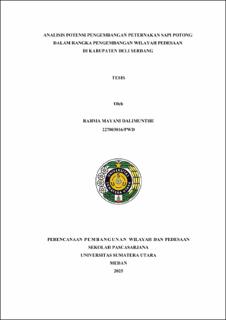Analisis Potensi Pengembangan Peternakan Sapi Potong dalam rangka Pengembangan Wilayah Pedesaan di Kabupaten Deli Serdang
an Analysis of the Development Potential of Beef Cattle Farming for Rural Development in Deli Serdang Regency

Date
2025Author
Dalimunthe, Rahma Mayani
Advisor(s)
Lubis, Suwardi
Kesuma, Sinar Indra
Metadata
Show full item recordAbstract
Beef cattle farming plays a pivotal role in enhancing food security, economic resilience, and rural development, particularly in developing countries such as Indonesia. This thesis develops a strategic framework for optimizing beef cattle farming by leveraging regional potential, with Deli Serdang Regency in North Sumatra serving as the focal case study. An integrated quantitative approach combining Location Quotient (LQ) and SWOT analysis is applied to assess spatial advantages, development dynamics, and both internal and external factors affecting sectoral performance. The findings indicate a significant increase in Deli Serdang’s LQ value, reaching 1.93 by 2024—signifying regional specialization in cattle production. The region also exhibits strong internal factor scores (IFE = 2.80) and favorable external conditions (EFE = 2.65), positioning it in the Strength-Opportunity (SO) quadrant, where aggressive development strategies are most viable. However, persistent challenges remain, including traditional practices, limited capital access, and seasonal feed availability. Adaptive measures such as credit facilitation (KUR), capacity building, and state-supported programs offer strategic mitigation pathways. Key recommendations include the institutionalization of spatial livestock zones, enhancement of feed infrastructure, farmer training in digital and climate-resilient practices, and partnerships with universities and agritech organizations. This thesis contributes to the body of regional development research and offers practical insights for policymakers seeking to sustainably strengthen livestock systems in support of food and economic security.
